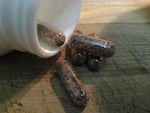Scientists from the U.S. Centers for Disease Control and Prevention recently looked into the case of an Oregon baby who suffered a bacterial infection and found the infection may have been associated with the mother’s consumption of her placenta.

Mothers can send their placenta off to be processed into placenta pills
Dan Ox / Flickr
The unidentified woman sent her placenta off to a company that said it would clean it and dehydrate it between 47 and 71 degrees Celsius. The company said it would grind what was left and put it into capsules to be stored at room temperature.
Dr. Genevieve Buser, a pediatric infectious disease specialist with Providence Health & Services, said there are no standards for processing placenta and heating to 54 degrees is required to reduce some bacteria counts to acceptable levels for consumption.
“I think that absolutely more research and studies needs to be done about understanding if it's even safe for mothers and their infants to be ingesting the placenta," she said.
Buser said what's clear in the Oregon case is that "there was an infection and it recurred."
The consumption of placenta, or placentophagia, is becoming more common. Some mothers think eating the placenta combats post-partum depression, aids in breast milk production and stabilizes hormones after giving birth.
The CDC reports the means of transmission in this case is unclear. But the same kind of Streptococcus bacteria found in the placenta pills were found in the baby, who was later discharged after a course of antibiotics.
